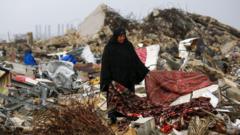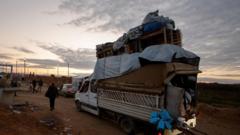Residents in southwestern Syria voice concerns as Israeli military operations escalate following the ousting of President Bashar al-Assad. What began as security measures are now perceived as a threat of long-term occupation, sparking fear and anxiety among local communities.
Uncertainties Loom Over Syria As Israeli Military Actions Escalate

Uncertainties Loom Over Syria As Israeli Military Actions Escalate
As Israel intensifies its military incursions into Syria, civilians express fear of an impending occupation amid a backdrop of political change.
In the village of Suwaisah, nestled in southeastern Syria, a palpable sense of fear has enveloped the community following a series of Israeli military incursions. Ruwayda al-Aqaar described a chilling encounter from late December when Israeli troops invaded their tranquil farming village, awakening her family to the sounds of tanks and soldiers. In her account, she articulated the overwhelming fear of displacement and loss of home, a sentiment echoed by other villagers.
These military operations began shortly after a coalition of Syrian rebels successfully ousted President Bashar al-Assad in early December. Initially portrayed by Israeli officials as necessary measures to secure their borders, the raids have persisted into February, sparking growing anxieties that they might signal a prolonged occupation of these regions.
Residents have observed the Israeli forces dismantling abandoned military outposts left by Syrian troops, with allegations that locals were pressured to surrender any remaining weapons. This bold display of military power has intensified fears within the Syrian populace about their sovereignty and future safety.
The consequences of these incursions are further complicated by the broader geopolitical dynamics at play. With the fall of Assad, power vacuums are forming that Israel may exploit for its national security interests. Consequently, the restoration of stability in southern Syria becomes increasingly uncertain as fears of a drawn-out military presence mount among its inhabitants.
In the face of a shifting political landscape, the local response remains one of apprehension as they navigate these tumultuous developments, which are shaping their daily lives and future prospects.
These military operations began shortly after a coalition of Syrian rebels successfully ousted President Bashar al-Assad in early December. Initially portrayed by Israeli officials as necessary measures to secure their borders, the raids have persisted into February, sparking growing anxieties that they might signal a prolonged occupation of these regions.
Residents have observed the Israeli forces dismantling abandoned military outposts left by Syrian troops, with allegations that locals were pressured to surrender any remaining weapons. This bold display of military power has intensified fears within the Syrian populace about their sovereignty and future safety.
The consequences of these incursions are further complicated by the broader geopolitical dynamics at play. With the fall of Assad, power vacuums are forming that Israel may exploit for its national security interests. Consequently, the restoration of stability in southern Syria becomes increasingly uncertain as fears of a drawn-out military presence mount among its inhabitants.
In the face of a shifting political landscape, the local response remains one of apprehension as they navigate these tumultuous developments, which are shaping their daily lives and future prospects.



















